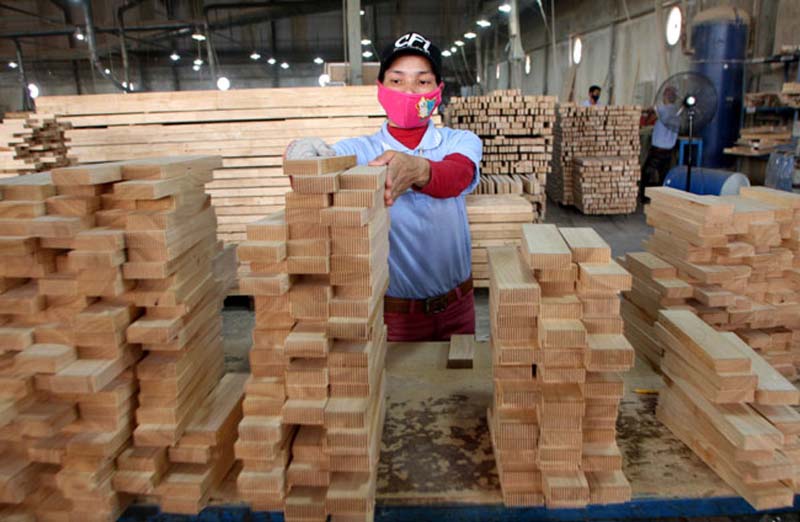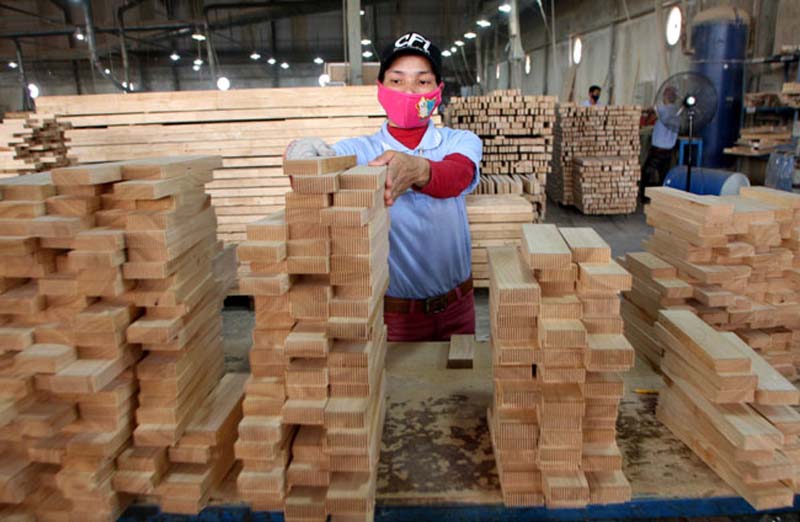
Vietnam’s export of wood and wood-based products is projected to reach 8.85 billion USD in 2018, up over 1 billion USD from the 2017 record of 7.7 billion USD.
Wooden
planks are manufactured at Minh Duong Furniture Corporation in Quang Nam
Province's Nui Thanh District. (Photo: VNA)
The Ministry of
Industry and Trade made the forecast based on strong growth of the sector in
the past 10 month.
Timber and wood products earned the country over 7.22 billion
USD between January and October, increasing 15.6 percent against the same
period last year.
Importing nearly 3.12 billion USD worth of Vietnamese wood
and wood-based products, the United States was Vietnam's biggest export market
in the period.
Also between January and October, Vietnam spent nearly 1.9
billion USD importing wood and woodwork products, translating into a trade
surplus of over 5.35 billion USD, an annual increase of nearly 1 billion USD.
Trade surplus of timber goods was ranked second among key
Vietnamese agricultural exports during the period, only behind that of aquatic
products, which recorded over 5.8 billion USD.
In October alone, export value of wood and wood products
stood at 845.4 million USD, up 25.3 percent year-on-year, with the US alone
accounting for 389 million USD, followed by Japan (104.45 million USD), China
(115.14 million USD) and the Republic of Korea (86.53 million USD). All of them
posted increases ranging from 10 to 40 percent compared to the same period last
year.
Nguyen Ton Quyen, General Secretary of the Association of
Vietnam Timber and Forest Product, said the last three months of a year are
always the peak time for forestry exports.
He unveiled that almost all enterprises in the sector have
now secured enough export orders for the rest of the year, mostly from the US,
EU, Japan, the Republic of Korea, and China.
Source: VNA
According to data from the Hoa Binh Provincial Party Committee, the industrial production index for the first six months of 2025 is estimated to have increased by 20% compared to the same period last year. This marks the highest year-on-year growth rate for this period since 2020.
In the first six months of 2025, Hoa Binh province’s export turnover was estimated at 1.145 billion USD, marking an 18.11% increase compared to the same period in 2024. Import turnover was estimated at $ 804 million, a 17.15% increase, which helped the province maintain a positive trade balance.
The lives of the ethnic minority farmers in Tan Lac district have gradually improved thanks to the new directions in agricultural production. This is a testament to the collective strength fostered through the professional associations and groups implemented by various levels of the district’s Farmers’ Union.
With the motto the "product quality comes first,” after nearly one year of establishment and operation, Muong village’s Clean Food Agricultural and Commercial Cooperative, located in Cau Hamlet, Hung Son Commune (Kim Boi district), has launched reputable, high-quality agricultural products to the market that are well-received by consumers. The products such as Muong village’s pork sausage, salt-cured chicken, and salt-cured pork hocks have gradually carved out a place in the market and they are on the path to obtaining the OCOP certification.
In the past, the phrase "bumper harvest, rock-bottom prices" was a familiar refrain for Vietnamese farmers engaged in fragmented, small-scale agriculture. But today, a new spirit is emerging across rural areas of Hoa Binh province - one of collaboration, organisation, and collective economic models that provide a stable foundation for production.
Maintaining growing area codes and packing facility codes in accordance with regulations is a mandatory requirement for agricultural products to be eligible for export. Recently, the Department of Agriculture and Environment of Hoa Binh province has intensified technical supervision of designated farming areas and packing facilities to safeguard the "green passport" that enables its products to access international markets.



